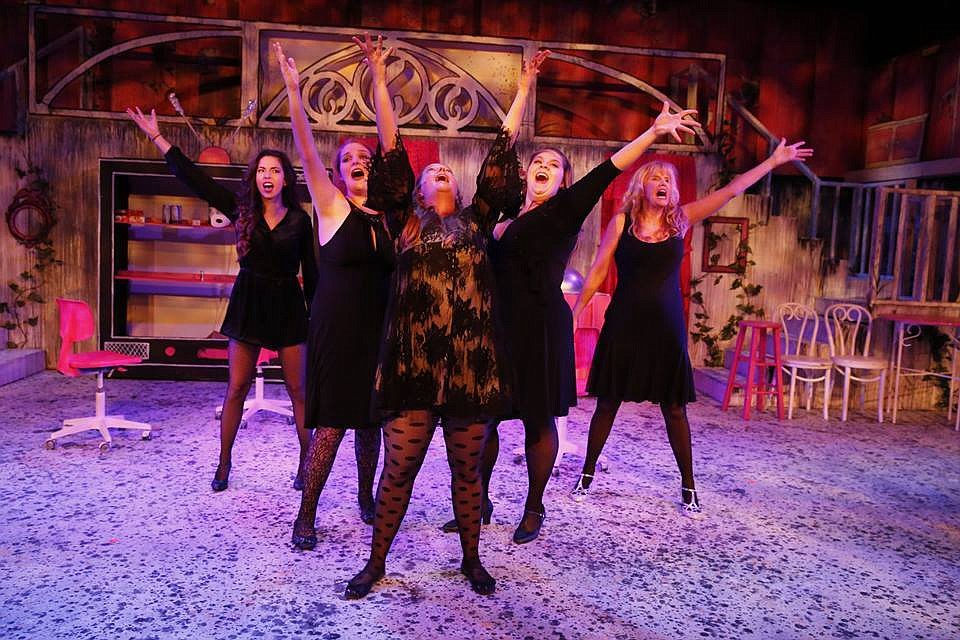- April 19, 2024
-
-
Loading

Loading

Imagine a ruined Earth in the far-distant future. An alien archaeological expedition combs through the ruins and wreckage. After stuffing their saucer with recordings of Frank Zappa’s “200 Motels,” Napoleon XIV’s “They’re Coming to Take Me Away,” and several metric tons of "National Enquirer" clippings, they return to their home world. If said aliens then decided to create a musical about the experience of American women in the late 20th century, it would probably resemble Mark Houston’s “Six Women with Brain Death,” the latest offering at Venice Theatre.
Hey, it’s a well-known fact that the inhabitants of Zeta Reticuli are seriously into musical theater. But I digress …
Houston, who wrote the music and lyrics, and his eight collaborators, who wrote the script, violate every theatrical rule conceivable. They violate rules I didn’t know existed until I noticed their absence here.
There’s no plot. No protagonist.
Story arc? Nah.
Dramatic tension? Negatory.
All-is-lost moment? Hero’s journey? Character-defining choice?
No, no, and no.
Sympathetic character who grows? File not found.
Great. Now that we’ve established what’s missing … What’s actually there?
Well. The titular six women, for starters. (Only five actresses on stage. The sixth is a blow-up doll.) OK. Based on this information, you might assume there are six (or five) running characters. Yes, a few names are dropped. But the characters’ names aren’t actually listed in the program, so let’s drop the subject.
I can tell you this: Houston stuffs his theatrical blender full of pop-culture references and hits puree.
And the women sing: A blonde bombshell’s severed head sings a country song about spiritual growth; an alcoholic shut-in has a duel and a duet with a soap opera character who comes out of her large-screen TV; a compulsive reader is burned at the stake on a bonfire of books — while singing of the futility of literacy.
Rambi — a Rambo-esque deer with an automatic weapon — sings of the cold Darwinian cruelty of forest life. And the joy of shooting hunters who start forest fires.
A female Messiah in a tinfoil hat sings of God, aliens and all or none of the above.
All five (or six) unnamed characters sing of Barbie and Ken’s sexual permutations.
All that — and divorce, rebellious children, booze, high-school reunions and the idiocy of tabloids and TV, besides.
Director Kelly Woodland straps you in and takes you on the switchback turns of a wild funhouse ride. According to my best sources, Alison Prouty, Nancy Denton, Liz Pascoe, Ariella Corinne Pizarro, Morgan Graves and Jane Livingston are the six actors leaping out at you along the way. One, I assume, stays offstage and does voiceover work for the blow-up doll. Who? Your guess is as good as mine.
The ride roars on, thanks to a lot of talent. Eli Schildkraut delivers excellent music direction; Brian Finnerty’s choreography is a fun parody of schlocky musical conventions. Nicholas Hartman’s costumes are a rummage sale of failed expectations. Gary Thornsberry’s set is a shabby equivalent of Pee Wee’s Playhouse.
OK, great. Much cleverness, abundant talent. Which adds up to … what?
Good question.
The play’s full, jaw-breaking title is: “Six Women with Brain Death, or Expiring Minds Want to Know.” "The National Enquirer" inspires the play’s action like holy writ. Bigfoot, aliens, two-headed babies. A Florida man did this, a Florida man did that. You get the picture.
From one perspective, all that tacky Americana is an easy target for cheap parody. A sneer at trailer-park humanity. A slap at stupid people, who aren’t like us.
From another perspective, the play does more than sneer. There’s a sense of joy behind the mockery, which I’ll explain with one more otherworldly comparison. Not a joke, this time.
Science-fiction writer Philip K. Dick was obsessed with eruptions of divine grace in the common, coarse, mundane and stupid. Houston and his collaborators share a similar obsession. Illogical as it may seem, their unnamed characters have a relentless, life-affirming joy.
The characters’ lives are full of crap, lies, delusions, loss and emptiness.
Logically, they should just give up.
But they sing anyway.